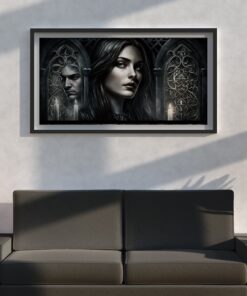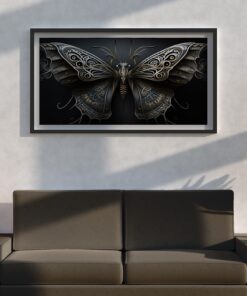
The Rise of Digital Gothic Art
The journey of Gothic art, from its medieval roots to its current digital incarnation, reflects a fascinating evolution. This art form, known for its dark themes, elaborate aesthetics, and emotional depth, has transcended its physical origins to thrive in the digital realm. Today, digital Gothic art has emerged as a significant genre, leveraging modern technology to reach a global audience. This transformation has not only made Gothic art more accessible but has also introduced it to a wider audience, ensuring its relevance and appeal in the contemporary digital age.
Understanding Digital Gothic Art
Definition and Characteristics
Digital Gothic art is characterized by its embrace of gothic motifs and themes, utilizing digital mediums to create artworks that are both visually striking and emotionally resonant. This genre encompasses a variety of subjects, including macabre landscapes, supernatural elements, and romantic melancholy, all unified by their dark, often eerie atmosphere. The use of digital tools allows for unprecedented creativity and detail, enabling artists to explore the depths of Gothic imagination like never before.
Transformation Through Digital Mediums
The transition to digital has revolutionized how Gothic art is created and consumed. Digital artists employ a range of software and techniques to bring their dark visions to life, from digital painting and 3D modeling to mixed media and photomanipulation. This digital approach has not only expanded the possibilities for artistic expression but has also democratized the creation and distribution of Gothic art, making it more accessible to both artists and audiences worldwide.
Key Themes and Motifs
Digital Gothic art is rich in symbolism and thematic depth, drawing on a variety of sources for inspiration. Common motifs include:
- Gothic architecture: Cathedrals, castles, and ruins that evoke a sense of mystery and history.
- The supernatural: Ghosts, vampires, and otherworldly beings that blur the line between life and death.
- Nature: Dark, foreboding landscapes that reflect the genre’s preoccupation with the sublime and the terrifying.
- Romanticism: Themes of love, death, and beauty that explore the complexity of human emotion.
These elements combine to create a genre that is not only visually captivating but also rich in meaning and emotion, reflecting the Gothic tradition‘s enduring fascination with the darker aspects of human experience and the natural world.
-
Gothic Wall Art Bella’s Ethereal Tapestry
$29.99 – $119.99 -
Gothic Wall Art Butterfly Shadowed Wings
$29.99 – $119.99 -
Gothic Wall Art Dark In Love Adelina
$29.99 – $119.99



